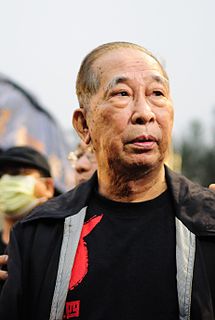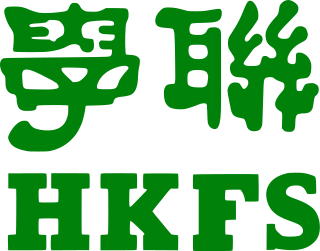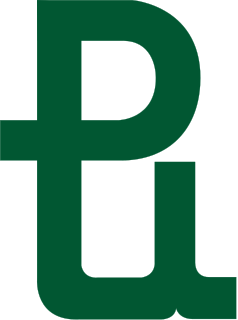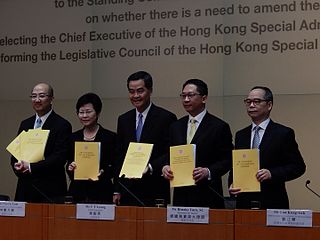Related Research Articles

Government Communications Headquarters, commonly known as GCHQ, is an intelligence and security organisation responsible for providing signals intelligence (SIGINT) and information assurance (IA) to the government and armed forces of the United Kingdom. Based at "The Doughnut" in the suburbs of Cheltenham, GCHQ is the responsibility of the country's Secretary of State for Foreign and Commonwealth Affairs, but it is not a part of the Foreign Office and its Director ranks as a Permanent Secretary.

The district councils, formerly district boards until 1999, are the local councils for the 18 districts of Hong Kong.

Szeto Wah was a prominent Hong Kong democracy activist and politician. He was the founding chairman of the Hong Kong Alliance in Support of Patriotic Democratic Movements of China, the Hong Kong Professional Teachers' Union and former member of the Legislative Council of Hong Kong from 1985 to 1997 and from 1997 to 2004.

The Hong Kong Federation of Students is a student organisation founded in May 1958 by the student unions of four higher education institutions in Hong Kong. The inaugural committee had seven members representing the four schools. The purpose of the HKFS is to promote student movements and to enhance the student body's engagement in society. Since the 1990s, the federation has taken an interest in daily events in Hong Kong, and no longer restricts itself to the areas of education and politics. The HKFS council (代表會) is convened by representatives of the university student unions. The representatives are elected by the university students. A standing committee is appointed by the council.

Duncan Campbell is a British freelance investigative journalist, author, and television producer. Since 1975, he has specialised in the subjects of intelligence and security services, defence, policing, civil liberties and, latterly, computer forensics. He was a staff writer at the New Statesman from 1978 to 1991 and associate editor (Investigations) from 1988 to 1991. He was prosecuted under the Official Secrets Act in the ABC trial in 1978 and made the controversial series Secret Society for the BBC in 1987. In 1988, he revealed the existence of the ECHELON surveillance program.

Subversion refers to a process by which the values and principles of a system in place are contradicted or reversed in an attempt to transform the established social order and its structures of power, authority, hierarchy, and social norms. Subversion can be described as an attack on the public morale and, "the will to resist intervention are the products of combined political and social or class loyalties which are usually attached to national symbols. Following penetration, and parallel with the forced disintegration of political and social institutions of the state, these tendencies may be detached and transferred to the political or ideological cause of the aggressor". Subversion is used as a tool to achieve political goals because it generally carries less risk, cost, and difficulty as opposed to open belligerency. Furthermore, it is a relatively cheap form of warfare that does not require large amounts of training. A subversive is something or someone carrying the potential for some degree of subversion. In this context, a "subversive" is sometimes called a "traitor" with respect to the government in power.
Sir Sze-yuen Chung, was a Hong Kong politician who served as a Senior Member of the Executive and Legislative Councils during the 1970s and 1980s in the colonial period and the first Non-official Convenor of the Executive Council in the SAR period. For his seniority in the Hong Kong political arena, he was nicknamed the "Great Sir" and "Godfather of Hong Kong politics".

The Five Eyes (FVEY) is an Anglosphere intelligence alliance comprising Australia, Canada, New Zealand, the United Kingdom, and the United States. These countries are parties to the multilateral UKUSA Agreement, a treaty for joint cooperation in signals intelligence.

The Hong Kong Professional Teachers' Union (HKPTU) was a pro-democracy trade union, professional association and social concern group in Hong Kong. Until its disbandment in 2021, it was the largest teachers' organisation in Hong Kong with more than 90,000 members.

The Office of Ombudsman is a Hong Kong statutory authority, established on 1 March 1989, charged with ensuring that Hong Kong is served by a fair and efficient public administration that is committed to accountable, openness and quality of services. It operates mainly by investigating and giving recommendations to government departments.

Democratic development in Hong Kong has been a major issue since its transfer of sovereignty to the People's Republic of China in 1997. The one country, two systems principle allows Hong Kong to enjoy high autonomy in all areas besides foreign relations and defence, which are responsibilites of the central government. Hong Kong's Basic Law, also adopted after the 1997 handover, allowed residents to vote for local district councillors and directly elect about half of the region's legislators at the time. Many Hongkongers became concerned, however, after the first Chief Executive, Tung Chee-hwa, appeared to have mishandled this issue, while human rights and universal suffrage have also become focal points for the pro-democracy camp.
Censorship in Hong Kong, which refers to the suppression of speech or other public communication, raises issues regarding the freedom of speech. By law, censorship is usually practised against the distribution of certain materials, particularly child pornography, obscene images, and reports on court cases which may lead to unfair trial.

Established in 1996, the Equal Opportunities Commission (EOC) is Hong Kong’s statutory body responsible for the implementation of the anti-discrimination ordinances, namely the Sex Discrimination Ordinance, the Disability Discrimination Ordinance, the Family Status Discrimination Ordinance and the Race Discrimination Ordinance.
The Hong Kong Observers was a middle class-based pressure group in Hong Kong that was active during the 1970s and 80s. It was formed by a group of young overseas-educated Chinese professionals and second-generation British expatriates who came together on 7 July 1975 to discuss issues affecting Hong Kong. It hoped to "supervise and criticise the government through objective research, exerting pressure on the government by influencing public opinion."
The Group of 89 or Business and Professional Group of the Basic Law Consultative Committee was a conservative political pressure group formed by the conservative business and professional elites led by tycoon Vincent Lo in the Hong Kong Basic Law Consultative Committee (BLCC) and Hong Kong Basic Law Drafting Committee (BLDC) during the drafting period of the Hong Kong Basic Law in the late 1980s. Compared to the Group of 190 set up by the pro-democracy groups, it was on the conservative side of debates over the constitutional reform, the Hong Kong Basic Law and the future of Hong Kong.

The 2014–2015 Hong Kong electoral reform was a proposed reform for the 2017 Hong Kong Chief Executive election and 2016 Legislative Council election.

The University of Hong Kong pro-vice-chancellor selection controversy surrounded alleged political interference behind the University of Hong Kong governing council's rejection of Johannes Chan's recommended appointment to the post of pro-vice-chancellor in charge of staffing and resources. Chan, dean of the Faculty of Law from 2002 until 2014, was unanimously recommended for the post by a selection committee headed by university president Peter Mathieson. The governing council's decision, the first time that a candidate selected by the committee was rejected, was widely viewed as political retaliation for Chan's involvement with pro-democratic figures including his former subordinate Benny Tai. A majority of HKU Council members are not students or staff of the university, and many are directly appointed by the chief executive of Hong Kong. The decision received international condemnation, and was viewed as part of a Beijing-backed curtailing of academic freedoms that would damage Hong Kong's academic reputation.
Liberalism has a long tradition as an economic philosophy since the founding of Hong Kong as an entrepôt which cherishes private property, the free market, and free trade. In recent decades, Hong Kong has earned its international reputation as one of the "freest economies in the world". As a political trend, liberalism has become the driving force of the democratic movement since the 1980s which is mainly represented by the pro-democracy camp which strives for the universal suffrage, human rights and rule of law in Hong Kong.
Deng Jiagui is a Chinese businessman, and brother-in-law of China’s paramount leader and general secretary, Xi Jinping.
References
- ↑ Campbell, Duncan (12 December 1980). "Colonialism: A Secret Plan for Dictatorship" (PDF). New Statesman. Retrieved 14 January 2021.
- ↑ Cheung, Gary (6 February 2010). "Group dared to criticise colonial rulers and was put under watch". The South China Morning Post.
- ↑ Hong Kong Legislative Council, Hansard/Official Record of Proceedings, 10 May 1995